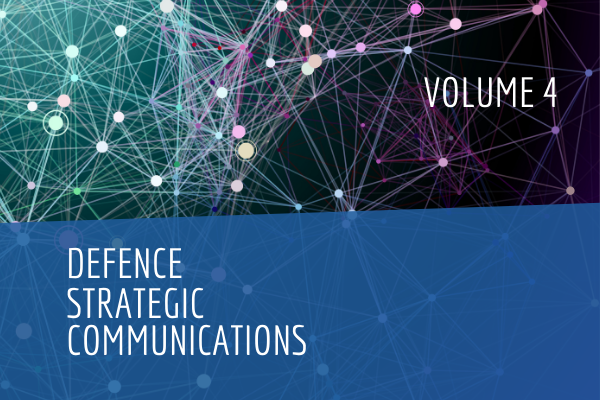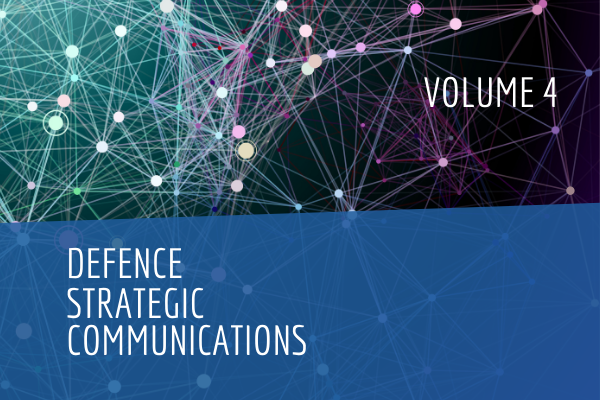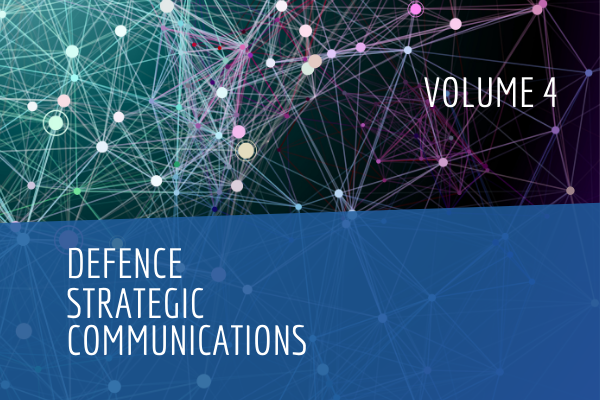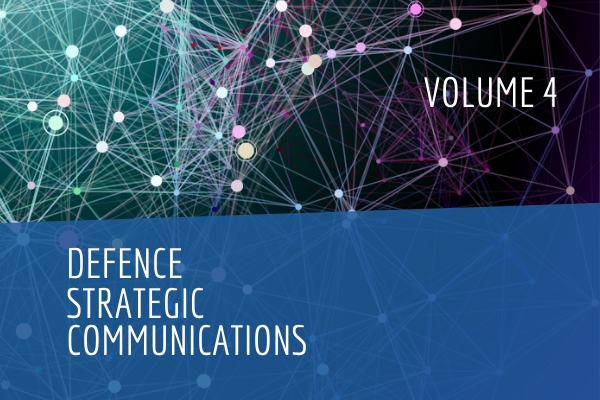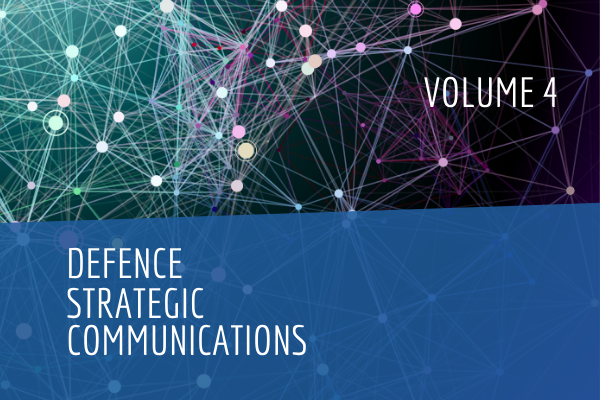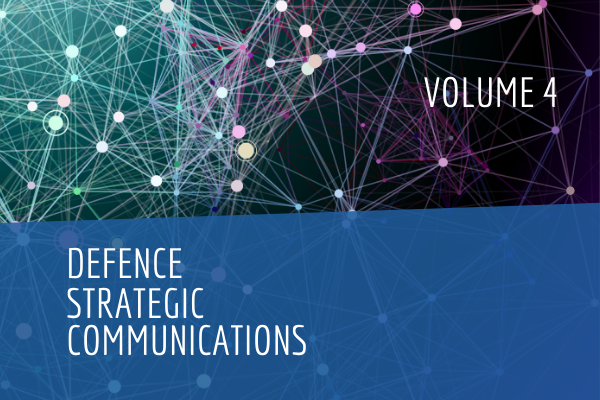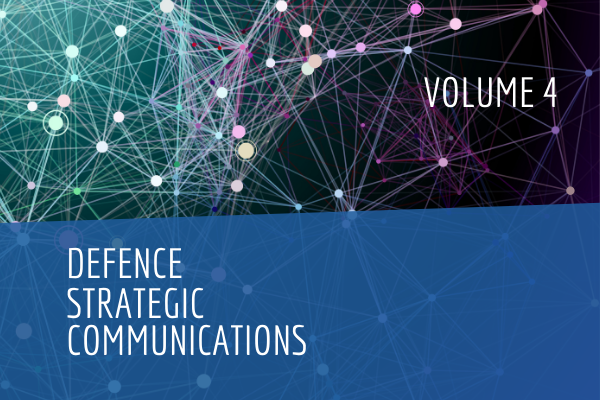Abstract
Fuelled by Russia’s annexation of Crimea, the question of how authoritarian regimes like Russia seek to influence information domains of foreign states has received unprecedented attention within the disciplines of security and strategic communications. However, we have yet to examine more deeply the Russian conceptualisation of information space and the Kremlin’s ability to exert control over its domestic information domain. The present study contributes toward filling these gaps by providing a more holistic understanding of the term ‘information space’ as it appears in Russian scholarship, and by analyzing the effectiveness of the economic and legal tools used by the Kremlin to establish control over the domestic information space. Ultimately, the study finds that whilst the Kremlin has been able to exert considerable influence over content production and distribution in certain spheres of the broader information space, it clearly enjoys only limited control over the new, increasingly Internet-dominated spaces and environments.
Keywords—Russia, information space, internet, media, Russian scholarship, information control, strategic communication, strategic communications
About the Author
Natalya Kovaleva is a graduate of King’s College London Department of War Studies. Her current research explores strategic communications, media studies, and information warfare, with particular focus on Russia’s approaches to information warfare.
Bibliography
Alekseeva, Marina Il’inishna, Ljudmila Dem’janovna Bolotova, Elena Leonidovna Vartanova, et al., Sredstva massovoj informacii Rossii: Učebnoe posobie dlja studentov vuzov [The Russian Mass Media: A Manual for University Students] ed. by Iasen Nikolaevich Zasurskij, (Moscow: Aspect Press, 2006).
BBC, ‘Russia Lenta.ru Editor Timchenko Fired in Ukraine Row’, 12 March 2014.
BBC, ‘Genprokuratura otkazalas’ proverjat’ fil’m “On vam ne Dimon” ’ [The Prosecutor General’s Office Refused to Check the Film “He’s not Dimon”], 23 June 2017.
BBC, ‘Miting v Moskve obernulsja rekordnym količestvom zaderžanij’ [The Rally in Moscow Turned into a Record Number of Detentions], 27 March 2017.
Becker, Jonathan, ‘Lessons from Russia. A Neo-Authoritarian Media System’, European Journal of Communication, Volume 19, Issue 2, (2004): 139–63.
Belikova, Julija V., Aleksandr Vasil’evič Korolёv, and Aleksandr Vladimirovič Krikunov, Setevye texnologii v informacionnyx operacijax NATO i zarubežnyx nepravitel’stvennyx organizacij v xode cvetnyx revoljucij i voennyx konfliktov [Network Technologies in the Information Operations of NATO and Foreign Non-governmental Organisations During Colour Revolutions and Military Conflicts] (Moscow: Akademia Federal’noj služby oxrany Rossijskoj Federacii, 2012).
Boleckaja, Ksenija, ‘ “Gazprom-media” kupil 7,5% akcij “Nacional’noj Media Gruppy” ’ [“Gazprom-Media” Bought 7.5% of Shares in “National Media Group”], Vedomosti, 31 March 2016.
________, ‘Mixaila Proxorova Vynuždajut Prodat’ RBK’ [Mikhail Prokhorov is Forced to Sell RBC], Vedomosti, 13 April 2017.
Carr, Madeline, US Power and the Internet in International Relations: The Irony of the Information Age (New York, NY: Palgrave Macmillan, 2016)
Castells, Manuel, The Rise of the Network Society, 2nd edition (Chichester: John Wiley & Sons, 2011).
Castells, Manuel, Communication Power (Oxford, UK: Oxford University Press, 2013).
Čajkovskij, Denis Vitol’dovič, ‘Informacionnoe Prostranstvo: Analiz Opredelenij’ [Information Space: Analysis of Definitions, Vestnik Burjatskogo gosudarstvennogo universisteta / ed. Osinsky [and others], Issue 14a Philosophy, Sociology, Political Science, Culturology (2010): 269–74.
Davydov, Sergej Gennad’evič, and Karеn Aleksandrovič Kazar’jan (eds.), Èkonomika Runeta. Èkonomika rynkov internet-servisov i kontenta v Rossii 2014–2015 [The Economics of Runet: The Economics of Internet Services and Content Markets in Russia 2014–2015], (Moscow: Associacija ėlektronnyx kommunikacii and Nacioanal’nyj issledovatel’skij universitet ‘Vysšaja škola ėkonimiki’, 2016).
De Smaele, Hedwig, ‘The Applicability of Western Media Models on the Russian Media System’, European Journal of Communication 14, Issue 2 (1999): 73–89. PAYWALL
DeNardis, Laura, The Global War for Internet Governance (New Haven, CT: Yale University Press, 2014).
Duffy, Natalie, ‘Internet Freedom in Vladimir Putin’s Russia: The Noose Tightens’, American Enterprise Institute, 12 January 2015
Dzjalošinskij, Iosif Mixajlovič, ‘Informacionnoe Prostranstvo Rossii: Političeskaja Metafora ili Nauchnoe Ponjatie’ [Russian Information Space: Political Metaphor or Scientific Concept], Pravo znat’: istorija, teorija, praktika, № 7/8 (July–August 2001): 56–57.
________, ‘Integrativnye processy v sovremennyx rossijskix media-sistemax, ili Čto proisxodit v rossijskom informacionnom prostranstve’ [Integrative Processes in Modern Russian Media Systems: Or What Happens in the Russian Information Space] in My—sograždane, ed. by Lidija Ivanovna Semina, 2 vols (Moscow: Bonfi, 2002).
________, ‘Mediaobrazovanie: rabota s tekstami ili umenie orientirovat’sja v mediaprostranstve?’ [Media Education: Working with Texts or the Ability to Navigate in the Media Space?] in Mediaobrazovanie 2013: Sbornik Trudov Meždunarodnogo Foruma Konferencij. 31 oktjabrja – 2 nojabrja 2013 g. [Media Education 2013: Collected Publications from the International Forum of Conferences 31 October – 2 November 2013], (Moscow: Sholokhov State University of Humanities, 2013).
Egorov, Viljonar Vasil’evič, ‘Na Puti k Informacionnomu Obščestvu’ [Towards an Information Society], (Moscow: Institut Povyšenija Kvalifikacii Rabotnikov Televidenija I Radiovešcanija, 2006).
Eremenko, Alexey, Weeding Out the Upstarts: The Kremlin’s Proxy War on Independent Journalism (Oxford: Reuters Institute for the Study of Journalism, 2015).
Filimonov, Georgij Jur’evič and Nikita Sergeevič Danjuk, Informacionnyj terror. Taktika i strategija informacionnoj vojny [Information Terror. Tactics and Strategy of Information War] (Moscow: Knižnyj Mir, 2017).
FOM Public Opinion Foundation, ‘Internet v Rosii: dinamika pronikinovenija’, [The Internet in Russia: Dynamics of Penetration], Spring 2017.
Freedom House, ‘Russia’, in Freedom of the Press 2012 (New York, NY: Freedom House, 2013).
Freedom House, ‘Russia’, in Freedom of the Net 2016 (New York, NY: Freedom House, 2016).
Frolov, Dmitrij Borisovič, Informacionnaja Voina: Evolucija form, sredstv i metodov [Information war: Evolution of Forms, Means and Methods], Sociologija Vlasti № 5, 2005: 121–46.
Gazprom Media website, ‘About Gazprom Media’, 2017.
Greitens, Sheena Chestnut, ‘Authoritarianism Online: What Can We Learn from Internet Data in Nondemocracies?’, PS: Political Science & Politics 46, Issue 2 (2013): 262–70.
Gunitsky, Seva, ‘Corrupting the Cyber-commons: Social Media as a Tool of Autocratic Stability’, Perspectives on Politics 13, Issue 1(March 2015): 42–54.
Gutterman, Steve, ‘Russia Blocks Internet Sites of Putin Critics’ Reuters, 13 March 2014.
Heritage, Timothy, ‘Independent Media Battle On in Putin’s Russia’ Reuters, 30 July 2015.
Ignatov, Vladimir Sergeevič, and Dina Vladimirovna Pimenova, ‘Informacionnoe Prostranstvo: Struktura i Funkcii’ [Information Space: Structure and Functions],
Izvestija vyšnix učebnyx zavedennij, Povolžskij region, obščestvennye nauki, Sociologija, № 3, 2007: 2–10.
Judina, Elena Nikolaevna, Mediaprostranstvo kak kul’turnaja i social’naja sistema [Media Space as a Cultural and Social System] (Moscow: Izdatel’stvo Prometej, 2005).
Jusupova, Elena Evgen’evna, Informacionnoe prostranstvo SNG: problemy, tendencii i perspektivy (1991–2001) [Information Space of the CIS: Problems, Trends, Perspectives (1991–2001], PhD thesis, (Moscow: Moskovskij gosudarstvennyj institut meždunarodnyx otnošenij (Universitet) MID Rossii (MGIMO), 2003).
Kalinina, Alla Eduardovna, ‘Osnovnye teoretičeskie položenija razvitija informacionnogo prostranstva xozjajstvennoj sistem’ [Main theoretical provisions for the development of the information space of economic systems] (Volgograd: Volgogradskij gosudarstvennyj universitet 2005).
Karpukhin, Sergei, Media Regulation in Russia: A Landscape Analysis of Laws and Trends, (Reuters, DLA Piper Rus Limited, 2016).
Katkova, Margarita Vladimirovna, ‘Ponjatie “informacionnoe prostranstvo” v sovremennoj social’noj filosofii’ [The Concept of “Information Space” in Modern Social Philosophy] Izvestija Saratovskogo Universiteta Serija filosofija, psixologija, pedagogija, Volume 2 (2008).
Kixtan, Valentina Venjaminovna, ‘Sovremennaja Rossija v zerkale mass-media’ [Contemporary Russia in the Mirror of the Mass Media, Sovremennye problemy social’no-gumanitarnyx nauk № 1, 2015.
King, Gary, Jennifer Pan, and Margaret Roberts, ‘How Censorship in China Allows Government Criticism but Silences Collective Expression’, American Political Science Review 107, Issue 2 (2013): 326–43.
Kravchenko, Maria, and Aleksandr Verhovsky, ‘Nepravomernoe primenenie antièkstremistskogo zakonodatel’stva v Rossii v 2015 godu’ [Illegal Application of Anti-Extremism Legislation in Russia in 2015], Sova Centre, 2 March 2016.
Krymr.com, ‘Kak obojti blokirovku Krym.Realii’ [How to Bypass the Blocking of Crimea.Realities], 2017.
Kuzina, Svetlana Ivanovna, and Dmitrij Aleksandrovič Mjakinčenko, ‘Informacionnoe Nasilie: Aspekty Nacional’noj Bezopasnosti’ [Information Violence: Aspects of National Security], Gosudarstvennoe i municipal’noe upravlenia, Učebnye zapiski SKAGS, № 3, (2015): 205–09.
Kuz’min, Aleksandr Gennad’evich, ‘ “Pravyj” Internet v Rossii: Specifika razvitija i problemy protivodejstvija’ [“Right-wing” Internet in Russia: The Specifics of Development and the Problems of Counteraction] Politeks № 3,
(2008): 74–96.
Lange-Ionatamišvili, Elina, Redefining Euro-Atlantic Values: Russia’s Manipulative Techniques, (Riga: NATO Strategic Communications Centre of Excellence, 2017)
Lehtisaari, Katja, ‘Market and Political Factors and the Russian Media’, Working paper, University of Oxford, Reuters Institute for the Study of Journalism, 2015.
Lipman, Maria, ‘Rethinking Russia: Freedom of Expression without Freedom of the Press’, Journal of International Affairs Volume 63, № 2 (2010): 153–69.
Lokshina, Tanya, ‘Draconian Law Rammed through Russian Parliament: Outrageous Provisions to Curb Speech, Privacy, Freedom of Conscience’ Human Rights Watch, 23 June 2016.
Lukashuk, Igor’ Ivanovič, Sredstva massovoj informacii, gosudarstvo, pravo [Mass Media, the State, Law] (Moscow: Stolnyj grad, 2007)
Maréchal, Nathalie, ‘Networked Authoritarianism and the Geopolitics of Information: Understanding Russian Internet Policy’, Media and Communication 5, Issue 1(2017): 29–41.
Meduza, ‘ “Paket Jarovoj” ubivaet internet-kompanii i pokušaetsja na častuju žizn’: I vot počemu’ [The ‘Yarovaya package’ Kills Internet Companies and Violates Privacy: This is Why], 24 June 2016.
Meduza, ‘ “Paket Jarovoj” prinjat bol’še polugoda nazad: Kak on rabotaet?’ [The ‘Yarovaya Package’ was Adopted More Than Six Months Ago: How is it Working?], 12 February 2017.
Merkulova, Tat’jana Alekseevna, ‘Social’no-informacionnoe prostranstvo sovremennoj Rossii i tendencii rasvitija’ [Social and Information Space of Modern Russia: Specifics and Trends in Development], PhD thesis, (Moscow: Moskovskij gosudarstvennyj universitet, 2005).
Moiseev, Nikita Nikolaevič, Universum. Informacija. Obščestvo. [Universe. Information. Society.] (Moscow: Ustojčivyj mir, 2001).
Nocetti, Julian, ‘Contest and Conquest: Russia and Global Internet Governance’, International Affairs 91, Issue 1 (January 2015): 111–30.
Oates, Sarah, Television, Democracy and Elections in Russia (London: Routledge- Curzon, 2006).
________, ‘The Neo-Soviet Model of the Media’, Europe-Asia Studies 59, № 8 (December 2007): 1279–97.
________, Revolution Stalled: The Political Limits of the Internet in the Post-Soviet Sphere (Oxford: Oxford University Press, 2013).
Pearce, Katy E., ‘Democratizing Kompromat: The Affordances of Social Media
for State-Sponsored Harassment’, Information, Communication & Society 18 № 10 (2015): 1158–74. PAYWALL
Petrov, Nikolay, Maria Lipman, and Henry E. Hale, ‘Three Dilemmas of Hybrid Regime Governance: Russia from Putin to Putin’, Post-Soviet Affairs 30, № 1 (January 2014): 1–26.
Pomerantsev, Peter, (2015) ‘The Kremlin’s Information War’, Journal of Democracy 26, № 4 (October 2015): 40–50.
Pomerantsev, Peter, and Michael Weiss, ‘The Menace of Unreality: How the Kremlin Weaponizes Information, Culture and Money’, The Interpreter, Special Report (New York: Institute of Modern Russia, 2014).
Radio Svoboda, ‘U Naval’nogo rasskazali o druge Putina, kotoryj vladeet ‘vsemi’ SMI’ [Navalny told about a Putin’s Friend who Owns ‘All’ the Media], 25 May 2017.
RBC, “Nameki na Kitaj”: možno li otključit’ Rossiju ot global’nogo interneta? [“Hints from China”: Is it possible to Disconnect Russia from the Global Internet?], 11 February 2016.
Raskladkina, Marina Konstantinovna, Internet kak sredstvo organizacii informacionno-politicheskogo prostranstva Rossii [The Internet as a Means of Organising Information and Political Space in Russia], PhD thesis, Saint-Petersburg State University, 2006.
Regina Smyth and Sarah Oates, ‘Mind the Gaps: Media Use and Mass Action in Russia’, Europe-Asia Studies 67, Issue 2 (2015): 285–305.
Renz B and Sullivan J., ‘Making a Connection in the Provinces? Russia’s Tweeting Governors’, East European Politics 29, Issue 2 (2013): 135–51. PAYWALL.
Reporters Without Borders, ‘World Press Freedom Index. Russia’, 2017.
RIA Novosti, ‘Komu prinadležat osnovnye SMI v Rossii’ [Who Owns the Main Media Outlets in Russia], 27 January 2012.
Roskomsvoboda, Zakonoproekt o novyx polnomočijax Roskomnadzora [Legislation on the New Powers of Rospotrebnadzor], 16 January 2017.
________, Raspredelenie blokirovok sajtov po vedomostvam [The Distribution of Blocked Sites Across Departments], 2017.
________, ‘Mnenie graždan, podpisavšix peticiju ob otmene “paketa Jarovoj”, vlastjam neinteresno (tekst rezoljucii i otzyvy gosvedomstv)’ [The Opinion of Citizens who Signed the Petition to Cancel the “Yarovaya Package” is Not Interesting for the Authorities (text of the resolution and the responses of state agencies)], 19 January 2017.
________, ‘ “Kitaizacija” Runet vxodit v aktivnuju fazui načnëtsja s toček obmena trafikom’ [The ‘China-isation’ of Runet Enters Its Active Phase and Will Start From the Traffic Exchange Points], 18 August 2017.
________, ‘V Gosdume prinimajut zakonoproekt o total’noj sležke. IT-otrasl’ i obščestvo konsolirovanno vystipajut protiv’ [‘The State Duma Adopts a Bill on Total Surveillance: The IT Industry and Society are Against It], 26 June 2016.
Rossošansky, Andrej Vladimirovič, ‘Evolucija političeskoj funkcional’nosti rossijskix SMI’ [The Evolution of the Political Functionality of Russian Media], Izvestija Saratovskogo universitetu, Serija Sociologija i Politologija, N.S. 12, № 1 (January 2012): 85–91.
Semenjuk, Eduard Pavlovič Razvitie informacionnogo prostranstva i progress obščestva [Development of the Information Space and of Societal Progress], Nauchno-texničeskaja informacija (Novosibirskij gosudarstvennyj texničeskij universitet), Series 1 (Organizacija i metodika informacionnoj raboty), № 1 (1997): 1–12.
Šarkov, Feliks Izosimovič, Osnovy teorii kommunikaciji [Fundamentals of the Theory of Communication]. Moscow: Izdatel’stvo torgovaja korporacija ‘Daškov i K°’, 2010.
Smirnova, Olga, Russian TV: Contesting European Values, Reuters Institute Fellowship Paper, (Oxford: University of Oxford, 2016).
Soldatov, Andrej Alekseevič, and Irina Borogan, The Red Web: The Struggle between Russia’s Digital Dictators and the New Online Revolutionaries (New York: PublicAffairs, 2015)
SOVA Center for Information and Analysis, ‘Xronika filtracii Runeta № 02’ [Chronology of Internet Filtration in Russia № 02], Moscow, 29 February 2016.
Starostin, Aleksandr Mixailovič, Sergej Ivanovič Samygin, and Anna Vladimirovna Vereščagina, ‘Evol’ucija vojny i mnogoobrazie eë form v uslovijax krizisa nacional’noj identičnosti i dinamiki ugroz informacionnoj bezopasnosti sovremennoj obščestva’ [Evolution of the War and Diversity of its Forms in the Context of the Crisis of National Identity and the Dynamics of Threats to Information Security of Modern Society], Socium i vlast’ № 5 (61) (2016): 49–54.
Russian Federation, ‘State Programme: Information Society, 2011–2020’, 20 October 2012.
Russian Federation, The Constitution of the Russian Federation (Garant-Inernet, 1993)
Russian Federation, The Information Security Doctrine of the Russian Federation, Approved by Vladimir Putin President of the Russian Federation on 9 September 2000.
Russian Federation, The Information Security Doctrine of the Russian Federation, 5 December 2016.
Russian Federation, Koncepcija formirovanija i razvitija edinogo informacionnogo prostranstva Rossii i sootvetstvujuščix gosudarstvennyx informacionnyx resuarsov 1995 god [The Concept on Formation and Development of the Common Russian Federation. The Russian Information Space and Corresponding State Information Resources 1995] (Novosibirsk: Sibirskoe otdelenie Rossijskoj akademija nauk, 1996).
Russian Federation, The Russian Federation Law on Mass Media, 27 December 1991.
Russian Federation, The Russian Federation Law ‘O vnesenii izmenenij v Federal’nyj zakon “O svjazi”’ [Federal Law On Amendments to the Federal Law “On Communications”], 2017.
TASS, ‘Sajt internet-izdanija “Krym Reali” zablokirovan v Rossii’ [The Website of the Internet Publication ‘Crimea. Realia’ is Blocked in Russia], 12 May 2016.
Toepfl, Florian, ‘From Connective to Collective Action: Internet Elections as a Digital Tool to Centralize and Formalize Protest in Russia’, Information, Communication & Society 21, Issue 4 (2018): 531–47. PAYWALL
________, ‘Four Facets of Critical News Literacy in a Non-democratic Regime: How Young Russians Navigate their News’, European Journal of Communication 29, Issue 1(2014): 68–82. PAYWALL
________, ‘Blogging for the Sake of the President: The Online Diaries of Russian Governors’, Europe-Asia Studies 64, Issue 8 (2012): 1435–59. PAYWALL
________, ‘Managing Public Outrage: Power, Scandal, and New Media in Contemporary Russia’, New Media and Society 13, Issue 8 (December 2011): 1301–19. PAYWALL
Traxtenberg, Anna Davidovna, ‘Runet kak “publičnaja sfera”: Xabermasiankij ideal i realnost’ [Runet as a Public Sphere: the Habermasian Ideal and Reality], Politeks № 2, 2006.
Ursul, Arkadij Dmitrievič, Perexod Rossii k ustojchivomu razvitiju: Noosfernaja strategija [Russia’s Transition to Sustainable Development: The Noösphere Strategy] (Moscow: Noösfera, 1998).
Ursul, Arkadij Dmitrievič, and Tat’ana Al’bertovna Ursul, ‘Globalizacija, ustojčivoe razvitie, noosferogenez: informacionnye aspekty’ [Globalization, Sustainable Development, Noöspherogenesis: Information Aspects], Novosibirsk Technological Institute, Naučno-texnicheskaja informacija, Series 2: Informacionnye processy i sistemy, Volume 1, № 4 (2005): 1–15.
Vartanova, Elena Leonidovna, and Sergei Smirnov, ‘A Brief Review of the Condition of the Media Market in Russia: The General Situation’; in: Elena Vartanova, Hannu Nieminen, and Minna-Mari Salminen (eds), Perspectives to the Media in Russia: ‘Western’ Interests and Russian Developments, Aleksanteri Series 4 (Helsinki: University of Helsinki, Aleksanteri Institute, 2009), pp. 117–44.
Vartanova, Elena L., Andrei V. Vyrkovsky, Mikhail I. Makeenko, and Sergey S. Smirnov, ‘The Russian Media Industry in Ten Years: Industrial Forecasts’, Westminster Papers in Communication and Culture 11, Issue 1 (2016): 65–84.
Veprintsev, Vladimir Bronislavovich, ‘Informcija v prostranstvennyx i geopoliticheskix kategorijax’ [Information in Spatial and Geopolitical Spaces], Trendy i upravlenie № 3, (2014): 302–08.
Vernadsky, Vladimir Ivanovič, Naučnaja mysl’ kak planetnoe javlenie [Scientific Thought as a Planetary phenomenon] (Moscow: Nauka, 1991). Also available in English: Scientific Thought as a Planetary Phenomenon (Moscow: Nongovernmental Ecological V.I. Vernadsky Foundation, 1997).
VGTRK Vserossijskaja gosudarstvennaja televizionnaja i radioveščatl’naja kompanija [All-Russia State Television and Radio], ‘Structure of the Russian Television and Radio Broadcasting Company’, 2017.
Vilkov, Aleksandr Alekseevič, Sergej Fëdorovič Nekrasov, and Andrej Vladimirovič Rossošanskij, Političeskaja funkcional’naja sovermennyx rossijskix SMP [The Political Functionality of Modern Russian Media], (Saratov: Izdatel’skij Centr ‘Nauka’, 2011).
Volkov, Denis Aleksandrovič, and Stepan Vladimirovič Gončarov, Rossijskij media-landšaft, televidenie, pressa, internet [The Russian Media Landscape: Television, Press, Internet] (Moscow: Avtonomnaja nekommerčeskaja organizacija ‘Analitičeskij Centr Jurija Levady’, June 2014).
________, So stola sociologov: Ėmpiričeskie issledovanija. Rossijskij medialandšaft. osnovnye tendencii ispol’zovanija SMI [From the Sociologists’ Table: Empirical Studies. The Russian Media Landscape: Main Trends in Media Consumption], Vestnik obščestvennogo mneija (Avtonomnaja nekommerčeskaja organizacija ‘Analitičeskij Centr Jurija Levady’) № 1/2 (124) January–June 2017.
Voronkova, Valentina Grigorovna (Valentyna Hryhorivna), Philosophy of Modern Society: Theoretical and Methodological Context, Monograph (Zaporizhzhya: RVV ZDIA, 2012).
White, Stephen and Ian McAllister, ‘Politics and the media in post-communist Russia’, in Katrin Voltmer, ed., Mass Media and Political Communication in New Democracies (London: Routledge, 2006), 210–27.
________,‘Did Russia (Nearly) Have a Facebook Revolution in 2011? Social Media’s Challenge to Authoritarianism’, Politics 34, Issue 1 (2014): 72–84. PAYWALL
